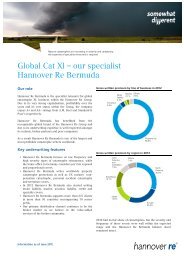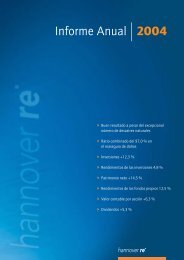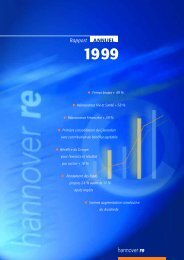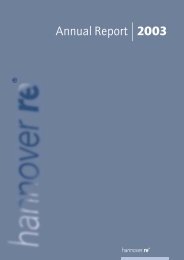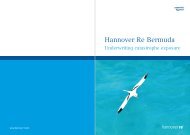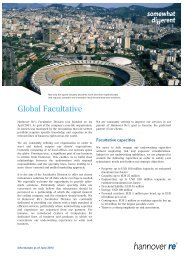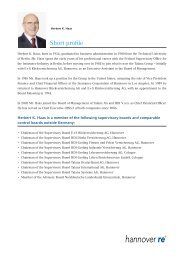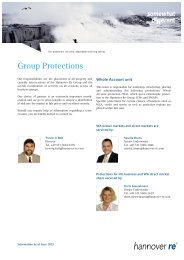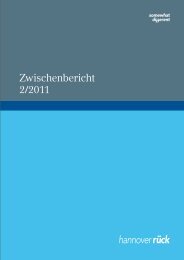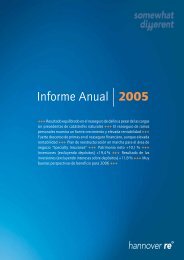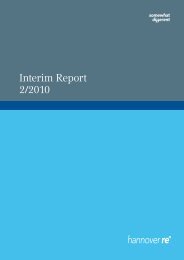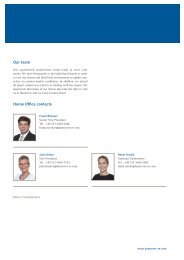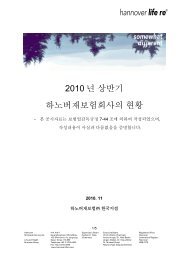Annual Report 2010 - Hannover Re
Annual Report 2010 - Hannover Re
Annual Report 2010 - Hannover Re
You also want an ePaper? Increase the reach of your titles
YUMPU automatically turns print PDFs into web optimized ePapers that Google loves.
Value-based management<br />
Our overriding strategic objective is to be one of the three<br />
most profitable reinsurers in the world and to increase our<br />
profit and the value of the company by a double-digit percentage<br />
every year.<br />
In order to achieve this objective we have developed tools that<br />
enable us, on the one hand, to measure in light of value-based<br />
considerations how close we are to accomplishing our objective<br />
and, on the other, to break down the goals and value contributions<br />
to the level of individual profit centres.<br />
In non-life reinsurance we have many years of positive experience<br />
using a ratio based on underwriting years, namely<br />
“DB 5”: level 5 of our contribution margin accounting method<br />
constitutes the clear profit after earning the discounted claims<br />
expenditure (level 1) plus all direct (level 2) and indirect costs<br />
(level 3), including the cost of capital (level 4). We apply DB 5<br />
to the non-life reinsurance treaty departments as part of the<br />
fine tuning of portfolios down to the level of individual contracts.<br />
In life and health reinsurance we use the Market Consistent<br />
Embedded Value (MCEV). The MCEV is defined as the intrinsic<br />
value of an enterprise, measured as the discounted profit<br />
flow until final run-off of the in-force portfolio – from the<br />
standpoint of the shareholder and after taxes.<br />
Both concepts reflect the specific characteristics of the individual<br />
segments. Together, they constitute the basis for our<br />
central management tool: Intrinsic Value Creation (IVC).<br />
With the aid of IVC it is possible to compare the value contributions<br />
of the Group as a whole, its two business groups and<br />
the individual operational units. This enables us to reliably<br />
identify value creators and value destroyers. In this way, we<br />
can<br />
• optimise the allocation of capital and resources,<br />
• identify opportunities and risks and<br />
• use IVC – as the core business result within the scope of our<br />
holistic management system Performance Excellence (PE)<br />
– to measure the extent to which we are able to execute our<br />
strategy.<br />
With Performance Excellence (PE) we have at our disposal a<br />
consistent method Group-wide that enables us to steer the<br />
development of the company and measure the extent to which<br />
we have achieved our strategic objectives, while at the same<br />
time accommodating the specific conditions of the various<br />
treaty departments and service units. The decentralised approach<br />
used by PE is of special importance in this context:<br />
every single organisational unit continuously examines its<br />
value contribution to the <strong>Hannover</strong> <strong>Re</strong> Group and develops<br />
improvement initiatives. At the same time, though, the “big<br />
picture” is never overlooked.<br />
System of value-based management:<br />
Performance Excellence (PE) combines the strategic and operational levels<br />
Plan Implementation Evaluation<br />
Strategy<br />
Executive Board<br />
retreat/GMF 1<br />
Executive Board<br />
retreat/GMF 1<br />
Executive Board<br />
retreat/GMF 1<br />
Performance<br />
Excellence<br />
PE Check<br />
PE Check<br />
PE Check<br />
<strong>Re</strong>sults<br />
Risks<br />
<strong>Re</strong>sources<br />
Planning process<br />
Management<br />
<strong><strong>Re</strong>port</strong>ing<br />
Management<br />
by Objectives<br />
Agreement on targets<br />
Attainment of targets<br />
Planning year –1 Planning year<br />
Planning year +1<br />
1 All managers of the <strong>Hannover</strong> <strong>Re</strong> Group worldwide come together once a year at the Global Management Forum (GMF) to define<br />
strategic orientations. The parameters developed here serve as the basis for the subsequent planning process.<br />
70 Management report opportunity and risk report<br />
<strong>Hannover</strong> <strong>Re</strong> Group annual report <strong>2010</strong>



